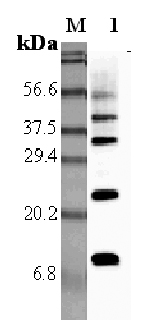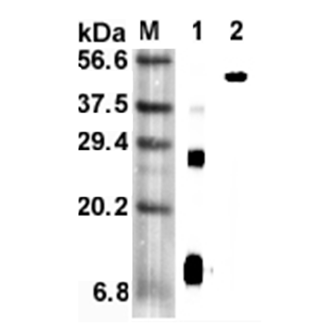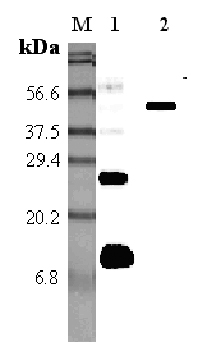
Western blot analysis using anti-RELM-alpha (rat), pAb (Prod. No. AG-25A-0011) at 1:5000 dilution. 1: Rat RELM-alpha.
anti-RELM-alpha (rat), pAb
AG-25A-0011
ApplicationsWestern Blot, ELISA
Product group Antibodies
ReactivityRat
TargetRetnla
Overview
- SupplierAdipoGen Life Sciences
- Product Nameanti-RELM-alpha (rat), pAb
- Delivery Days Customer10
- ApplicationsWestern Blot, ELISA
- CertificationResearch Use Only
- ClonalityPolyclonal
- Concentration1 mg/ml
- Gene ID81712
- Target nameRetnla
- Target descriptionresistin like alpha
- Target synonymsHimf, resistin-like alpha, RELMalpha, cysteine-rich secreted protein FIZZ1, hypoxia-induced mitogenic factor
- HostRabbit
- Protein IDQ99P85
- Protein NameResistin-like alpha
- Scientific DescriptionPolyclonal Antibody. Recognizes rat RELM-alpha. Weakly cross-reacts with mouse RELM-alpha. Detects a band of ~9.5kDa by Western blot. Source: Rabbit. Applications: ELISA, WB. Liquid. 0.2microm-filtered solution in PBS, pH 7.4. Contains no preservatives. RELM-alpha is a member to the family of adipocyte-secreted proteins called adipocytokines. It is abundantly expressed in white adipose tissue but not in preadipocytes, nor 3T3-L1 adipocytes. RELM-alpha is involved in the regulation of colonic inflammation and might be a link between colonic injury, glucose tolerance, and energy intake. - RELM-alpha is a member to the family of adipocyte-secreted proteins called adipocytokines. It is abundantly expressed in white adipose tissue but not in preadipocytes, nor 3T3-L1 adipocytes. RELM-alpha is involved in the regulation of colonic inflammation and might be a link between colonic injury, glucose tolerance, and energy intake. Recently, RELM-alpha (from epidermis) has been shown to be induced by skin microbiota. The function of RELM-alpha is to kill bacteria of the skin via membrane disruption. RELM-alpha is induced by vitamin A and explains the mechanism by which vitamin A regulates skin immunity.
- ReactivityRat
- Storage Instruction-20°C,2°C to 8°C
- UNSPSC41116161



